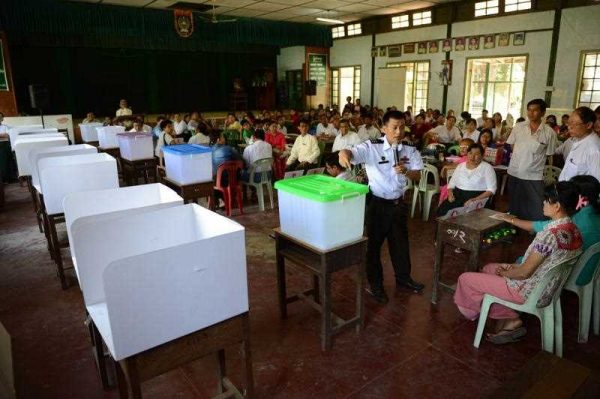Some observers have been critical about the incomplete nature of Myanmar’s reforms to date. But it should be remembered that one four-year term is not a long time to spend debating complex policies. The 2015 elections were never going to be the means to resolve all Myanmar’s residual political issues. It is not reasonable to expect that elections themselves could deal with the more deep-seated and systemic problems that Myanmar faces. Yet Myanmar’s people may lose confidence in reforms if these matters are not given higher priority during the next parliament.
The first and by far the most important issue is that of the Myanmar constitution itself. The document was drawn up under the military regime of 1988–2006 without the full participation of other political parties, such as the opposition National League for Democracy (NLD). It was ‘endorsed’ in a dubious referendum in 2008. The constitution left the Myanmar army with pre-eminent powers and an important political ‘comfort zone’ in which its institutional interests and inappropriate behaviours were not seriously challenged.
Although the military regime was formally terminated in early 2011, after Myanmar’s 2010 elections, it was not politically possible under the elected government of President Thein Sein to conduct a full review of the constitution. Discussion of some of the manifestly undemocratic provisions of the constitution occurred in the parliament. But amendments to clauses preventing the NLD’s Aung San Suu Kyi from becoming president and requiring 75 per cent of votes in parliament to allow amendments were blocked by the Tatmadaw (which reserves 25 per cent of the seats for its own appointments) in July 2015.
Revision of the constitution is, unsurprisingly, a high priority for the NLD but it will need extensive negotiations in the parliament. This would probably take a full five-year term to complete. By any measure, Myanmar could not be considered by anyone to be ‘democratic’ until the constitution is changed.
The challenge will be to accomplish this in a way that does not provoke the powerful army into staging a coup, as has happened repeatedly in neighbouring Thailand. But if the army participates fully in the parliamentary process, this should be feasible. Ending the capacity that the army has effectively enjoyed to act with impunity since independence is a vital step towards a durable democracy.
The second, related piece of unfinished business is to restore the rule of law in Myanmar. Little or no progress has been made in enacting badly needed judicial reforms, despite the creation of a Rule of Law and Tranquillity Committee in the parliament (of which Aung San Suu Kyi became chair after her election to parliament in 2012). Dealing with the corruption and poor performance of the entire court system is a matter of the greatest urgency for both internal and international bodies, which depend on fair and speedy treatment in Myanmar’s courts.
Restoring confidence in the courts to make them an asset, rather than a liability, in achieving reforms cannot be delayed any longer. Whether it is individual citizens or corporate entities who might be involved, the demand for a much better judicial system is obvious.
The third piece of important unfinished business is to translate Myanmar’s present constitutional arrangements into a truly practical federal system suitable to Myanmar’s circumstances. A starting point would obviously be the Nationwide Ceasefire Agreement signed with some, but not all, ethic communities on 15 October 2015. The agreement needs to be extended to other groups — including the Kachin Independency Army and United Wa State Army — and consolidated into fully-fledged peace agreements with consequential socio-economic and cultural elements added. These elements are intended to be designed and implemented at the regional level with properly delegated formal responsibilities.
Different federal systems are practised successfully around the world — with or without formally delegated constitutional powers, and with differing financial arrangements. It should be quite feasible for Myanmar to adopt a federal system that suits its conditions and effectively meets the needs for representative, decentralised and responsive government at the local level.
Finding the right solutions for such problems must lie primarily in the hands of the Myanmar people, but Myanmar’s leaders have now shown they need not fear seeking outside advice and help where it may be necessary or where it may offer already proven approaches. Recent experience — with this election, as well as with framing new economic and trade policies — suggests that relevant expertise in such areas should be readily available to Myanmar’s next government.
In the same vein, it would probably be unrealistic to expect other unfinished political business — such as agreeing on the proper status for the Rohingya Muslims — to be resolved easily or soon, much as the international community might hope that it would be. For now, it remains absolutely clear that there is no domestic political consensus in Myanmar supporting a change of policy to accord citizenship and full rights for Rohingya. Until such time as a universally backed policy can be developed, the Rohingya crisis will persist and continue to spill over onto Myanmar’s neighbours.
Trevor Wilson is a visiting fellow at the Department of Political and Social Change at The Australian National University.

